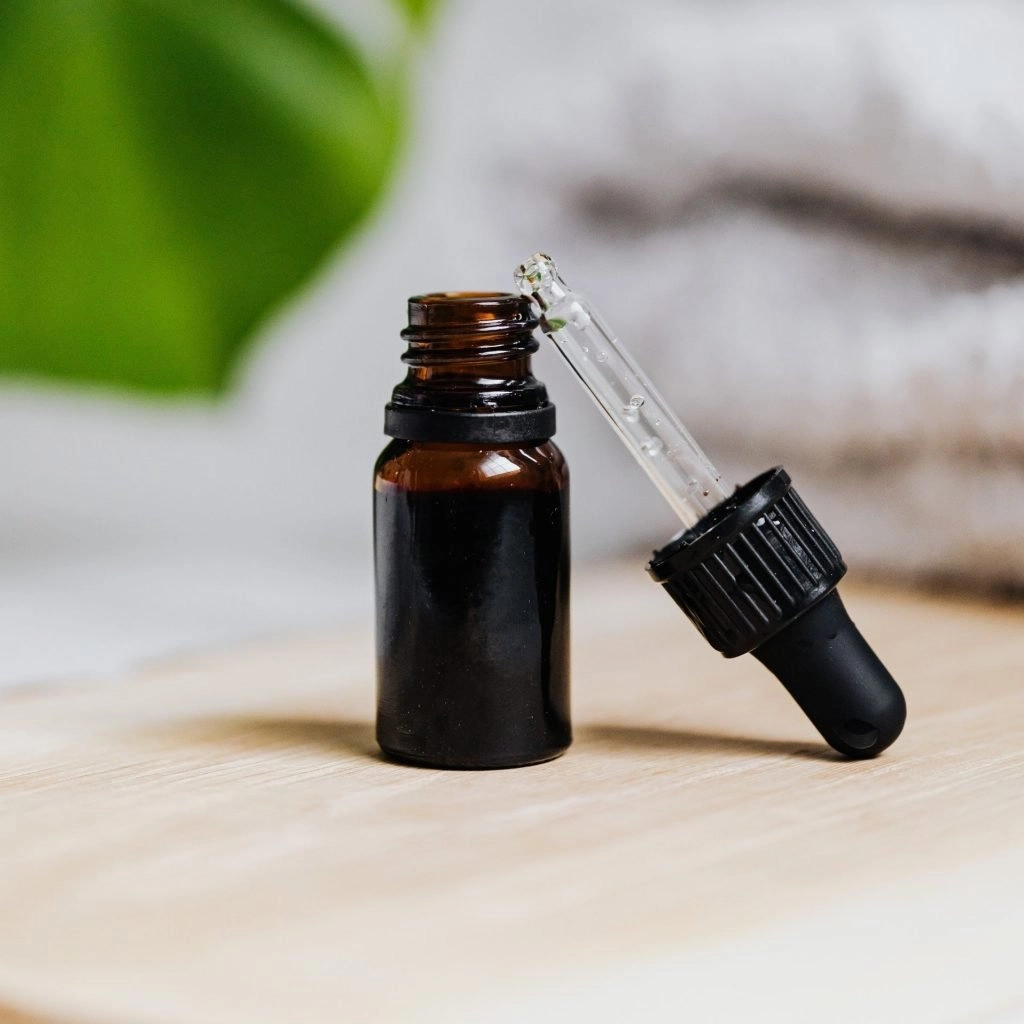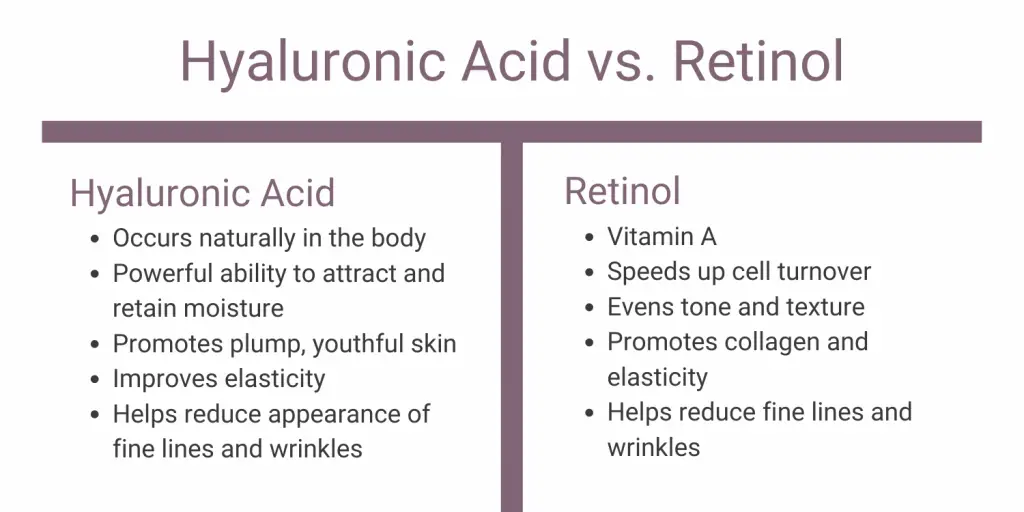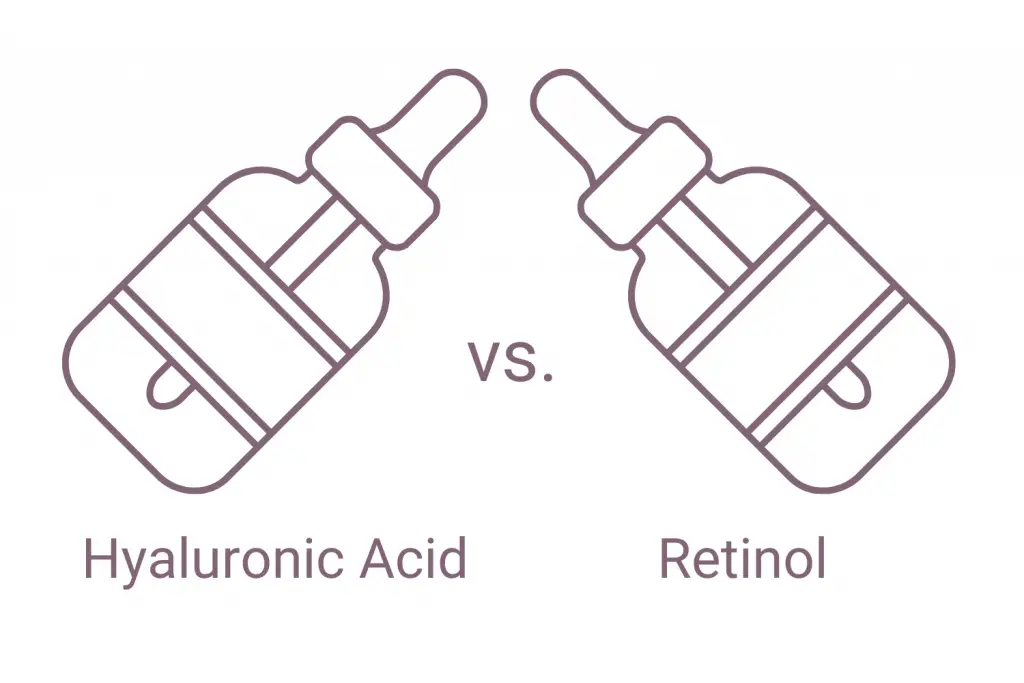Are you looking for healthy, all-natural products that can help you improve your skincare routine? Are you looking for a way to invest in your overall health? If so, you may have heard about hyaluronic acid and retinol.
This post may contain affiliate links. Read the full disclosure here
Even though both ingredients are popular, they do have their differences. You need to learn about the benefits, drawbacks, and applications of each of these products so you can make the best decision for yourself and your health. What do you need to know about hyaluronic acid vs. retinol?
Hyaluronic acid and retinol are both powerful anti-aging ingredients. Hyaluronic acid draws water to itself that helps the skin retain moisture and reduce the appearance of fine lines and wrinkles. Retinol is a form of vitamin A that increases cell turnover and promotes collagen production for a smoother and more youthful complexion.
An Overview of Hyaluronic Acid
First, let’s take a closer look at hyaluronic acid. What is hyaluronic acid, and how might it help you take care of your skin?

What Is Hyaluronic Acid?
Hyaluronic acid is a molecule that is a combination of multiple amino acids and sugar molecules. In general, hyaluronic is a particle that draws water to itself. That is how it exerts its effects across the human body. This unique property applies to skincare ingredients as well.
Hyaluronic and works in combination with elastin and collagen, supporting the structure of your underline tissues. When it comes to skincare, hyaluronic acid can help you increase the firmness and bounciness of your skin.
As you get older, your production of collagen and elastin will decrease. The same is true of hyaluronic acid. As you get older, you will not produce as much hyaluronic acid as you did in the past. That is why topical skincare products that contain hyaluronic acid have become more popular.
It is important to take a closer look at the benefits of hyaluronic acid. That way, you can figure out how you might be able to use hyaluronic acid to help you improve your skincare routine.
Hyaluronic Acid Skin Benefits
If you use hyaluronic acid to take care of your skin, there are several benefits you will enjoy. These include:
- Hyaluronic acid will naturally draw moisture into your skin. If you have dry skin, hyaluronic acid might help you treat this effectively.
- Hyaluronic acid can also help your skin feel more plump. You may also notice that your skin is smoother.
- Hyaluronic acid is also an antioxidant. It can neutralize free radicals that otherwise cause tissue damage.
- Hyaluronic acid can also help you reduce signs of aging. If you are trying to get rid of marks and blemishes, hyaluronic acid might be able to help you.
- Because hyaluronic acid draws water to your skin instead of oil, it can also be helpful in the treatment of acne.
Even though hyaluronic acid does provide a lot of benefits for skin care, there are numerous other benefits you may enjoy as well. For example, hyaluronic acid can help you increase wound healing. It regulates inflammation levels and can reduce pain. If you have open sores on the surface of your skin, hyaluronic acid might be able to help you.
Furthermore, hyaluronic acid draws moisture to itself no matter where it is located in the body. For example, hyaluronic acid in the joints draws moisture to the joints, helping them stay lubricated. Therefore, if you suffer from joint pain, hyaluronic acid may be able to help you with this as well.
Clearly, there are numerous benefits of hyaluronic acid. How might you be able to use this ingredient?
Hyaluronic Acid Uses
In general, highly erotic acid is used as a moisturizer for the skin. If you are looking for a way to increase your skin healing process, then hyaluronic acid can be helpful because it is an antioxidant. Even though it tends to work quickly, it is important to take a look at the ingredients in the product you use.
Hyaluronic acid comes as an oral medication, an injectable option, a moisturizer, and a serum form. If you take a look at the ingredients on the back of your makeup products, you may see hyaluronic acid included. At the same time, you do need to take a look at the ingredients carefully. Even though hyaluronic acid comes with very few side effects, there may be other ingredients included in the supplement or makeup product that could lead to unwanted complications.
In general, hyaluronic acid is available over-the-counter. It usually does not require a prescription; however, if you are looking for an injectable form of hyaluronic acid, you will need to see a medical professional who can help you with that.
Because hyaluronic acid is a popular option for skincare, there are multiple delivery methods available.
More hyaluronic acid comparisons you’ll like:
An Overview of Retinol
Next, it is time to take a closer look at retinol. What do you need to know about retinol, and how might it be able to help you take care of your skin?

What Is Retinol?
Before getting into retinol, it is important to understand what retinoids are. All derivatives that come from vitamin A are retinoids. One of these rivets is retinol. Of all the retinoids that come from vitamin A, retinol is one of the most potent. Furthermore, you can obtain retinol over the counter without a prescription.
When you apply retinol to the surface of the skin, it is converted into retinoic acid. Retinoic acid is the active ingredient that acts on your skin cells. Because of the positive actions of retinoic acid, retinol has become one of the most important skincare ingredients. How might it be able to help you take care of your skin?
Retinol Skin Benefits
If you decide to use retinol on your skin, there are several significant benefits you will enjoy. These include:
- Retinol can help you expedite skin cell turnover. This means that you can get rid of dead skin cells faster and bring young, healthy skin cells to the surface. This could make your skin look younger.
- Retinol can also help you produce more collagen, which is important for getting rid of wrinkles.
- Retinol can also help your skin firm up and become bouncier.
- You can also use retinol to help you tighten your pores. As a result, retinal can also be an effective part of treating acne, particularly regarding the regulation of oil production.
Ultimately, there are numerous benefits that come with using retinol to help you take care of your skin. It is important to compare the benefits and drawbacks of retinol before you decide to use this on your skin.
Retinol Skin Uses
Of course, every possible treatment comes with a few possible side effects. Retinol comes in various potencies. In general, if you already have dry skin, you may want to start with a lower potency. As mentioned above, retinol reduces oil production. Therefore, if your skin is already dry, retinol could cause your skin to start cracking. That is why you should start with a lower potency to see how you respond. Then, you may want to increase your potency to get the effects your desire.
Furthermore, you should also think about how many times per week you are using retinol on your skin. For example, you may want to start by using retinol once per week. If you find you are getting benefits from it, but you still want more. Consider increases usage up to twice a week if you skin is tolerating well.
Ultimately, there are several possible applications of retinol on your skin. These include:
- You can use retinol to help you increase collagen production.
- You can also use retinol to help you reduce signs of sun damage, skin aging, and other blemishes on the surface of your skin.
- You can also use retinol to help you get rid of wrinkles and tighten your skin.
If you are looking for retinol, there are several products available. For example, you can find retinol as a moisturizer, gel, and cream. Furthermore, retinol is also available as a serum. If you take a look at the ingredients on the back of your makeup products, you may find that retinol is one of the active ingredients in your beauty products.
Keep in mind that retinol can be a potent product. Therefore, you should use caution when you are applying it for the first time. You might want to start at a lower percentage before you increase it. There is a reason why higher potency retinol products usually require a prescription.
More retinol comparisons you’ll like:

What Are the Similarities Between Hyaluronic Acid and Retinol?
So, what are the similarities between hyaluronic acid and retinol? There are several important similarities to note. These include:
- Hyaluronic acid and retinol are molecules that occur naturally in the environment. Retinol is a derivative of vitamin A. Hyaluronic acid is produced in a similar mechanism to collagen and elastin.
- Both hyaluronic acid and retinol can be effective in the treatment of certain skincare issues. For example, if you are looking for a way to get rid of wrinkles, hyaluronic acid and retinol can help you. If you are looking for a way to reduce signs of aging and treat sun spots, both hyaluronic acid and retinol can help you with this as well.
- Both hyaluronic acid and retinol can treat acne in different ways. Retinol reduces the production of oil. Hyaluronic acid draws moisture to the skin to block out potential oils.
- Both hyaluronic acid and retinol are available over the counter. This means that you should be able to purchase them from the pharmacy without requiring a prescription. On the other hand, there are more potent forms of that was medications that could require a prescription. For example, if you want to increase the percentage of retinol, then you may need a prescription. Or, if you are looking for an injectable form of hyaluronic acid, you may need a prescription for this as well.

Ultimately, both hyaluronic acid and retinol are active ingredients in a wide variety of skin care and skin rejuvenation products. Even though there are a lot of similarities between hyaluronic acid and retinol, there are several differences as well. It is these differences that may be able to help you figure out which one is right for you.
What Are the Difference Between Retinol and Hyaluronic Acid?
There are several important differences between hyaluronic acid and retinol as well. These include:
- Mechanism of Action: The mechanism of action of these two ingredients is different. Retinol works by increasing collagen production in the skin. Hyaluronic acid works by drawing moisture to itself, increasing the water content in the skin. Both are beneficial.
- Duration of Treatment: Retinol and hyaluronic acid take different amounts of time to work. If you are looking for something that can work in a matter of minutes, then you may want to go with hyaluronic acid. If you are willing to wait for a longer amount of time, retinol could take weeks or months to show results.
- Side Effects: Hyaluronic acid and retinol are goat safe; however, you have a greater chance of experiencing side effects if you use retinol. If you use too much retinol, you run the risk of drying out your skin, causing it to crack.
- Area of Action: Hyaluronic acid tends to work closer to the surface of the skin. It repairs and hydrate skin at the upper cell layers. In contrast, retinol is able to exert its effects far beneath the surface of the skin. If you are looking for something that can increase the help of multiple skin layers, then you may want to use retinol instead.
These are just a few of the key differences between hyaluronic acid and retinol. It is important to think about these differences when you are trying to figure out when you should use hyaluronic acid or retinol.
Which Skincare Product Is Best for Which Person?
So, what skincare products should you use? If you are wondering whether you should use hyaluronic acid or retinol, there are several important points to note. These include:
- If you are someone who already has relatively dry skin, then you may not want to use retinol at first. Retinol can dry out your skin, causing it to crack and bleed.
- If you are okay with a product that is only going to moisturize the top few layers of your skin, then you may want to use hyaluronic acid.
- If you are looking for a product that has almost no risk of side effects, then you may want to choose hyaluronic acid. Retinol can lead to side effects if it is used improperly.
- If you are looking for a product that will act as quickly as possible, then you may want to use hyaluronic acid. It can exert its effects in a matter of minutes.
- If you are looking for a product that will insert benefits that last for a longer amount of time, then you may want to choose retinol. Retinol stimulates collagen production, while hyaluronic acid acts to moisturize the skin.
- If you want to use a product that can take care of wrinkles, then you may want to choose retinol.
- Even though both products can work well in the treatment of acne, retinol usually works better and lasts longer.
These are just a few examples of how you might want to choose between the two products. Fortunately, you do not necessarily have to pick between them.
Can You Use Hyaluronic Acid and Retinol Together?
Even though there are a lot of people who are wondering which skincare product they could choose, the reality is that you do not have to choose between them. They work well together. Those molecules occur naturally in the environment, and you probably ingest both of them regularly as a part of your diet. Therefore, you can combine the both of you are looking for a more comprehensive skincare routine.

Furthermore, they actually have a synergistic effect. What this means is that both of them become more effective if you use them together. If you are curious about how to use both of them, you may want to talk to your dermatologist or primary care doctor. That way, you can make sure you are maximizing the benefits of both of these products.
Consider using hyaluronic acid and retinol together if you want to get the most out of your skincare regimen! This might do wonders for your appearance and improve your self-confidence and self-esteem!




